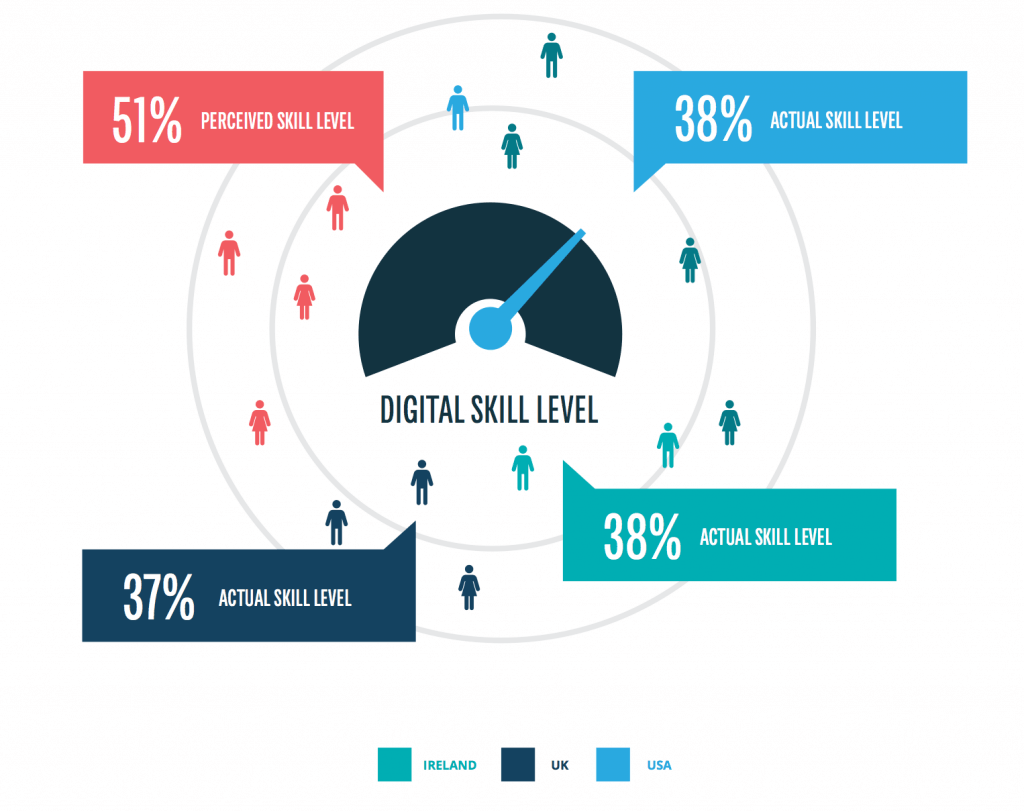Currently, there’s uncertainty about the future of the UK workforce. With Brexit on the horizon, concerns about the widening skills gap are becoming more pressing.
Many industries have issues with skill gaps, but the gap in digital is profound. Our workforce already lacks digital professionals and graduates and the UK economy is increasingly tech-focused.
Recruiting the digital talent we need from overseas is likely to become more difficult post-Brexit. Uncertainty about the future also makes workers reluctant to change jobs because they’re waiting to see what happens – and this has a negative effect in terms of development, training and upskilling.
What is the digital skill gap?
The digital skill gap isn’t new. References have been made to the technology skill gap since 2005. Across STEM subjects (science, tech, engineering and maths) there’s a shortage of 40,000 workers for roles in the growing digital economy. And with many high-level digital roles unfilled, the skill gap is affecting digital transformation and progress in the UK.
Tech and digital transformation in organisations is overtaking the pace at which education can adapt to provide relevant and up-to-date training. Starting at primary school level, there’s a lack of digital education at every level of society. Even the best technology graduates leave university without the practical skills to enter the digital workplace or are ill-equipped with skills that are already out of date.

How can we approach this problem?
In order to close the skill gap, education needs to keep up to speed with technology and establish more agile ways of developing course materials that prepare graduates adequately for digital roles. Although training needs to be available starting at school level, efforts need to be made in institutions and sectors to upskill workers at a pace to match technological advances.
Our very own CEO, Davina, discussed her idea of mandatory coding lessons in schools that would introduce both boys and girls to tech at an early stage – meaning better digital literacy in future generations.
In almost every industry we’re quickly moving towards a time where every worker needs at least some digital skills. Literacy in tech and digital is going to be essential for people to compete in the jobs market. Hiring approaches in the digital sphere need to be based on the ability to learn and adapt as opposed to specific experience as many candidates aren’t yet prepared for high-level digital roles.
Given this disparity, there’s a need to shift the focus to upskilling existing workers and providing frameworks for employees to acquire new digital skills on the job.
As a talent acquisition consultant at Fimatix, I find it useful to look for candidates who are willing to learn, adapt and be flexible over specific industry experience. The people with the right attitude and ability to upskill as they work are the best placed for digital roles.
Funding and diversity in tech
In August, the Department for Digital, Culture, Media and Sport (DCMS) announced a digital skills fund to boost diversity in the tech sector. This £1m fund is available to initiatives that aim to boost digital skills for disabled and underrepresented groups. A further £400,000 is allocated to equip older and disabled people with digital skills.
These underrepresented groups include women, people from minority backgrounds and those from lower socioeconomic areas. Currently, less than 40% of digital roles go to women and 88.8% of the digital workforce is white, showing a significant lack of diversity.
These digital skills will feed into the workplace, but a level of digital literacy is becoming essential for everyone in all areas of life, from booking appointments to renewing important documents. Digital upskilling is important for everyone so they can engage with our digital society. Minister for Digital Margot James said:
“If we want to maintain our position as a world-leading digital economy we need to work with industry, local authorities and the voluntary sector to develop solutions so no one is left behind.”
Transformation is a continuous process and one that demands support and accountability. Government has appointed a head of capability for the civil service digital profession. They have been laying the foundations needed to deliver the growth in skills and will monitor the progress and efficacy of digital training programmes.
At Fimatix, we’re experts in Digital by Default. We’ve worked with Government Digital Services ourselves on a number of projects and know what the workforce of tomorrow needs in terms of digital capabilities. We understand what’s needed to close the skill gap in the UK and the opportunities this presents. We set out to recruit people with an aptitude for learning and who have the potential to be the digital leaders of tomorrow.
If this sounds like you, get in touch.